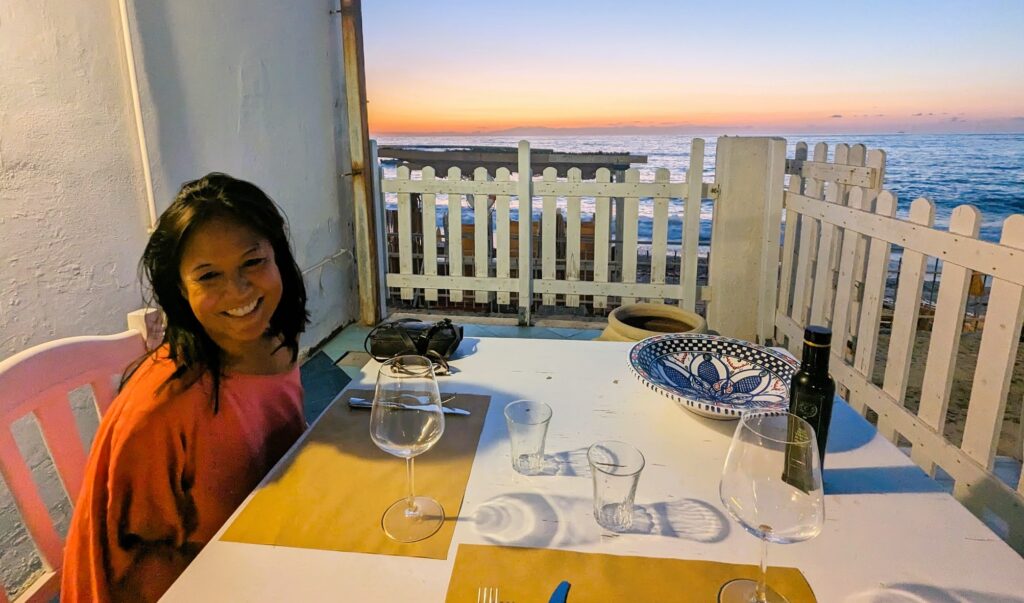
Searching for Stanley or Touching the Tucci Shall We Say
by Deborah Brand Probst
“Dear Michele, my husband and I are in Tropea for a month. Any day and any time you can accommodate us we would like to come for dinner. Or lunch. Or a cooking class. Or whatever you would have us do. We would like to come.”
This was the plaintive email I sent for the third time. Our friend Achim was sending similar emails on his side. His was a bit more urgent as he and his wife Mila were only in town for a long weekend and they urgently wanted to eat at La Cipolla Rossa. Such is the effect of watching Stanley Tucci eat at this restaurant.
A very expensive, by Calabrian standards, vegetarian restaurant that was never open, didn’t respond to phone calls, and didn’t have an online reservation system. You had to email them and patiently wait for a reply. Maybe.
The website clearly states that when they finally get back to you and you were able to get a reservation, on the day of the reservation they would send you the menu of what they were serving that night and you had to reconfirm your reservation by 9 AM that morning or forfeit your reservation. That’s it. Did I mention that this was a vegetarian restaurant? In Italy? That served every dish with onions? Tropea red onions, that is. I don’t like raw onions, red or otherwise. And the four of us – Mark and I, Achim and Mila – are hard-core carnivores. Like, as in, we will eat raw meat carnivores.
So, for this kind of effort for a restaurant that clearly didn’t care if we came or not was a new precedent for us. We don’t even bother with this kind of trouble for Michelin-starred restaurants in Manhattan.


But here we are in Calabria begging the proprietor to let us come and pay him a pile of money to eat onions in every dish. Such is the newly found phenomena and rock star power of Stanley Tucci’s Searching for Italy. Perhaps we missed Anthony Bourdain so much that he fills a gap in our foodie travel lives that we stay glued to each episode, faithfully capturing on my Google Map list each place he ate.
Perhaps it’s because we are determined to eat our way through every crevice of this country. Or perhaps it is Calabria – everywhere you turn the red onion highlights the urban landscape, hanging from gorgeous storefronts, lowly carts, sneaking into high-brow paintings, postcards, tourist photographs, and roadside stands. I immediately buy some from the market, and we eat it the first time we see it on a menu. We eat it at home. Every day. It is a fruit – full of sweetness and none of the acidity of a typical red onion. It is juicy, slightly tart, bursting with flavor. This is what it tastes like in the hands of an amateur. What would it taste like in the hands of a master?
We had to find out what this onion was all about, and surely Osteria della Cipolla Rossa would be the highest manifestation of this lowly vegetable. They named the “restaurant” after it, after all. Although on the website it clearly states “it is not a restaurant.” It is “It is a new eco-sustainable food model for the maximum well-being of man and the environment.” We MUST get in.
Finally, an email from Michele to Achim. “They can seat us at 7:30 on Monday. Shall we do it?” he WhatsApps us. “What do you mean ‘shall we do it’? Of course we shall do it, we’ve been trying for months!”
Beads of sweat trickle down our backs as we find ourselves the lone diners on an outdoor patio facing the hot setting sun on a deceptively cool-looking Tyrrhenian Sea. It has been over 100 degrees for four days in a row with no breeze and no end in sight. Michele brings us a little bread and a bottle of olive oil, which he explains is grown about 25 km away.
With this, we have a bottle of mineral water. We are parched. We would die for some wine. The mosquitoes are starting to nibble at our ankles. We devour our bread before our wine comes. We are the only table tonight. Michele explains that he only takes two tables a night maximum. Each dish takes hours to prepare.
The first dish finally comes out, and it is two pieces of soft, pillowy ricotta lightly grilled, served with a compote of sorts of delicately sautéed red onion, a healthy sprig of fragrant basil, and a dollop of local balsamic on the side. The dish is painstakingly plated. Mosquitoes forgotten. As if on cue, the breeze picks up a bit.
The wine comes to the table, and it is divine. We forget that we were dying. The next dish is a spaghetti with, wait for it, red onion. But this time, the onion is cooked all the way down so that it is a delicate, gelatinous sauce, sprinkled with basil, sweet and savory, layered in between a tower of spaghetti. I jealously eye everyone else’s plate as I devour my last bite. I could have eaten three more helpings. It goes on like this for the rest of the night. I wiped up every single last little morsel with the bread – this is rare for me. The hype is justified. I tell Michele we are coming back tomorrow. I want to cook in the kitchen. He laughs. I am deadly serious.



In Search of Ricci
“Scylla was a supernatural female creature, with 12 feet and six heads on long snaky necks, each head having a triple row of sharklike teeth, while her loins were girdled by the heads of baying dogs. From her lair in a cave she devoured whatever ventured within reach, including six of Odysseus’s companions.” Encyclopedia Brittanica
“They have ricci!” Achim declares from Il Principe, another of the restaurants that Stanley Tucci ate in the episode on Calabria. This seals it. After our experience at Osteria della Cipolla Rossa, we decide to go all in and chase the other restaurants, especially since I had been chasing the elusive sea urchin since the year before in Puglia. As much as I typically don’t care about onions, I adore sea urchin. Yes, adore is the word. I will brave gorgons and sea monsters for it. Off to Scilla we go.
In the summertime, this delightful little seaside town boasts a pleasant bay with a crescent beach cuddled by a steep hillside town on one side. On the other side of a castle promontory, the traditional fishing village tumbles into the sea, the waves splashing onto steps and footpaths, reminding me more of Venice than Calabria. Little fishing boats bob up and down in the waves, cats run around chasing the cast-offs from fishermen and restaurants alike. It is a gorgeous day, but it is easy to see how in the dead of winter this part of town can remind you that perhaps the sea monster after which the town is named can raise her chilly tentacles and pull you right onto the rocks.
But not today. Today we will sit outside at Il Principe, and I will have ricci. And that we do. We also order the crudo appetizer plate, a sumptuous bounty of glistening sweet red prawns, urchin, clam, and tuna. We inhale this as we sit at our table perched over the sea, the waves splashing at our feet, Sicily in the not-too-distant horizon. The involtini di spada is grilled to perfection, olive oil coating the fresh swordfish that we mop up lustily with fresh crusty bread. The spaghetti with ricci is also swimming in a pool of olive oil. I don’t mind. This is not the time for counting calories.
After lunch, we walk around the town, peeking through tiny alleyways and clambering on rocks before heading back to the car. We have a long way to go to head to Qafiz, the Michelin-starred restaurant that features prominently in Searching for Italy. It is very far inland and in the middle of literally nowhere in Calabria. We are determined.
After the Fire
Our first week in Calabria, we were chased out of our cottage in Ciaramiti by fire. The flames came lapping up to the property line as we begged the firemen to let us go into the house to get our passports. Being nomads, we carry our lives in our suitcases. We do not have a home except for what we bring with us. They finally relented after two hours of lurking around the area. We rushed in and grabbed as much as we could.
Later on, we are told that the fires happen every year and are started by arsonists, sometimes hitting the same lots year after year. Centuries-old olive trees, UNESCO heritage villages, acres of national park—all destroyed. The year before, 22 arsonists were caught in Calabria. This year, there are more.
I am reminded of this again as we drive out to Qafiz, the country roads framed by wild forests, tamed vineyards, olive groves, and raw, naked, blackened hills from years of devastation. I recall that in the episode, Qafiz serves a dessert called “After the Fire” in memory of the first massive fire that destroyed hundreds of acres of the Aspromonte where Qafiz is located. It is a dirge of sorts, a somber reminder for diners after a bacchanalian feast.
Our reservation is for 7:30, so we drive around the gorgeous countryside after we locate the restaurant. We change in the car out of our bathing suit seaside gear and into heels and jacket dinner attire worthy of a Michelin-starred restaurant. Since the episode premiered, the restaurant now has a couple of rooms on the property, for people who want to stretch out their dining experience by staying the night on their grounds.
We get there early and have indulgent cocktails by the placid, picture-perfect pool before being graciously walked into the dining room by a perfectly dressed sommelier. It is all incongruous in this tiny little village of six seemingly abandoned buildings. There are more stray dogs on the street than people.
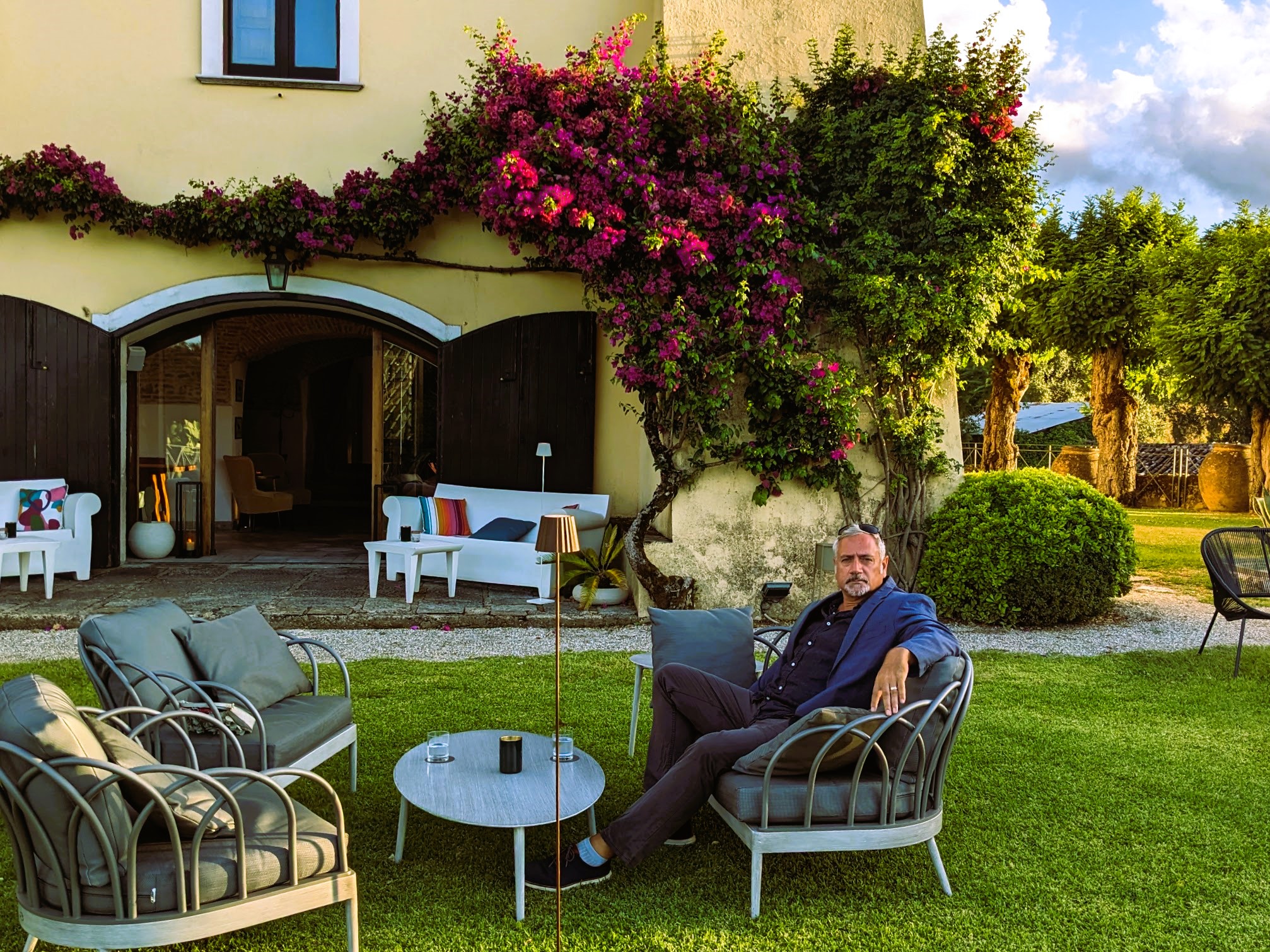
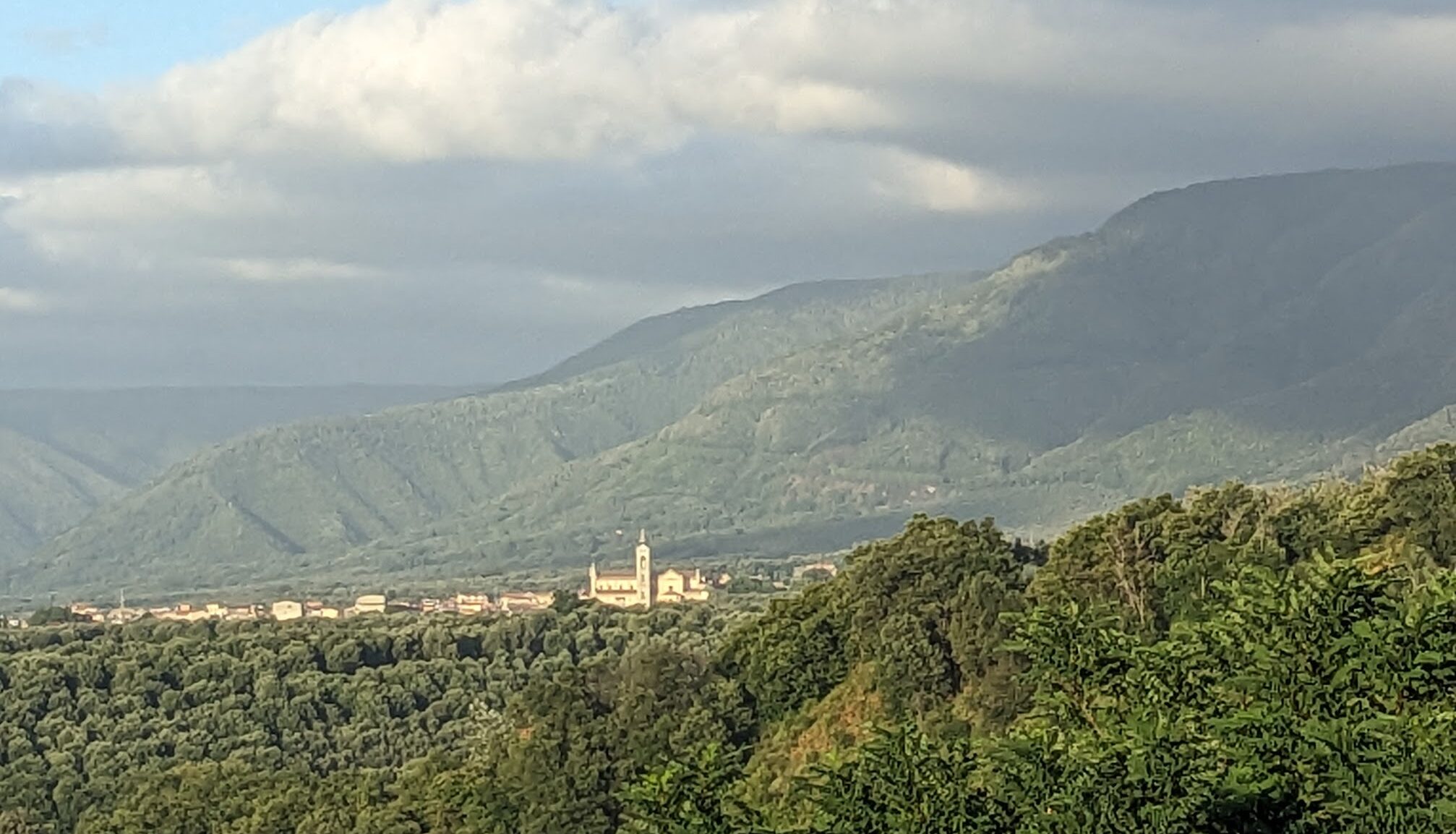


A Foraged Feast
The menu at Qafiz reads like a Calabrian surf and turf, to use a crude American term which usually means a lobster and a steak. Here it is finely crafted fresh seafood punctuated by foraged herbs, vegetables, leaves, fruit – a love song to Calabria, served with all Calabrian wines. Prix fixe menus are often wasted on me as I am usually too full, too drunk, too overwhelmed by the fourth curated course to truly appreciate what happens from course 5 through x. Not this time. This time I savor every note and sip a gorgeous sparkling rosé, opting for this bottle instead of the pairing with the thought that we can always bring it home.
We are all seated around an open kitchen as we watch the chef prepare delicate sauces, grill a perfect pigeon and debone the breast, shy servers with just enough English skills to describe your meal only to retreat in horror were you to ask them a question. Their movements, however, are perfectly orchestrated as they plate and pour with perfect synchronicity for all 12 diners.
This time my urchin comes on a bed of seaweed with a fluffy avocado cream. It is served after the barbecued pigeon with candied fig, wild chicory, and hazelnut. And yes, the final dessert, “Long After the Fire,” a theatrical chocolate bark dessert smothered in ash and smoke. It is all spectacular. Afterwards, they chase us out back to the garden for our after-dinner drinks. We make friends with another couple who are indulging in a birthday cigar and a mezcal cocktail of all things. We trade numbers before excusing ourselves for the long drive home to our little house surrounded by ash and smoke.
And now they all grow onions
The following week we are treated to Mauro and Eva’s spread of canapés, bottles of wine, and a spectacular sunset from the patio of their house – the show of Stromboli erupting in the distance like a planned Disney show right at sunset. And then the fireworks, one after the other down the coast after the sun goes down. We make a plan to go wine tasting after we were all smitten by the wines we had at Qafiz.
We tell Eva and Mauro we had gone back to Osteria La Cipolla Rossa another time for more Tropea red onion dishes with Michele. This time he indulges with a little singing at our table with Mark as his fondness for great food only slightly overshadows his obsession with American classic rock. They have a good laugh over this and we set a time to see them at the “winery.”
I put it in quotes because it’s not really a winery. It is a family house and garden that once held an agriturismo and a thriving restaurant. Now as you go through the gates, the pathway is silent. The six long community tables in the garden sit empty. The restaurant with its family heirloom artifacts, pots, and artwork is festooned with a layer of dust and neglect. Our host has graciously agreed to host us for a wine tasting after much pestering. This is not something he normally does. Mauro, Eva, and their son arrive, and he takes us into the back of the house where the wine production occurs next to the field of neglected greenhouses which stand testimony to the time when they were filled to the brim with tomatoes, green beans, pumpkins, eggplant, and herbs that would be harvested daily for the restaurant. The vineyard beyond is edged with charred fields from the wild fires.
The wine production “hut” is surrounded by boxes and messy plastic crates; it is a working distribution center as well, a family affair as everyone jumps in to ship wines.
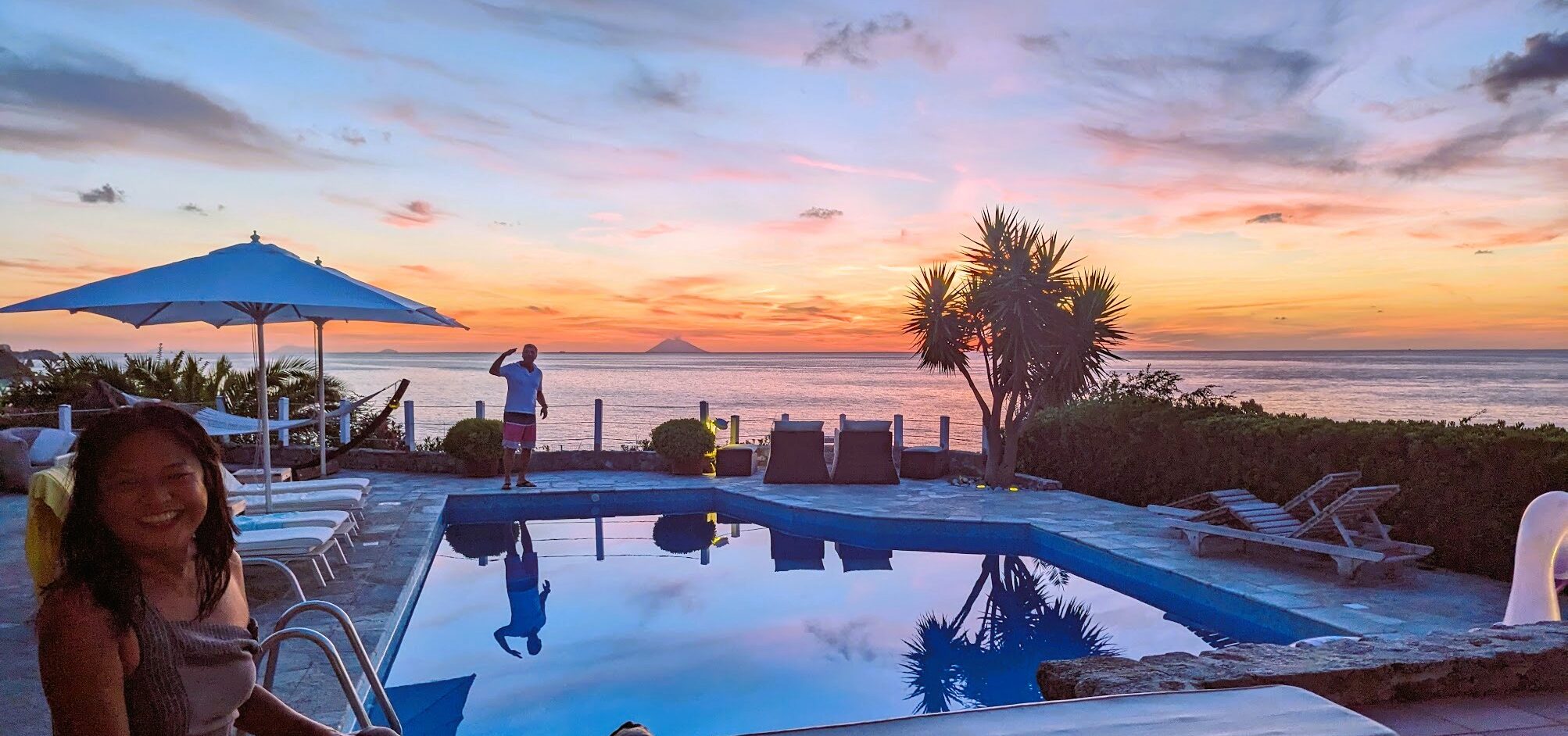

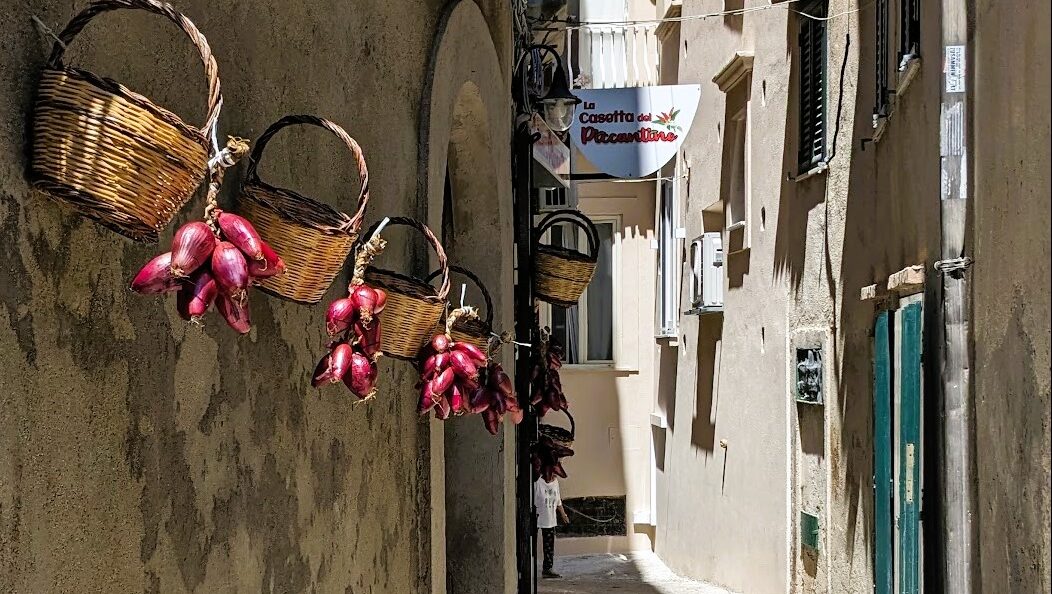

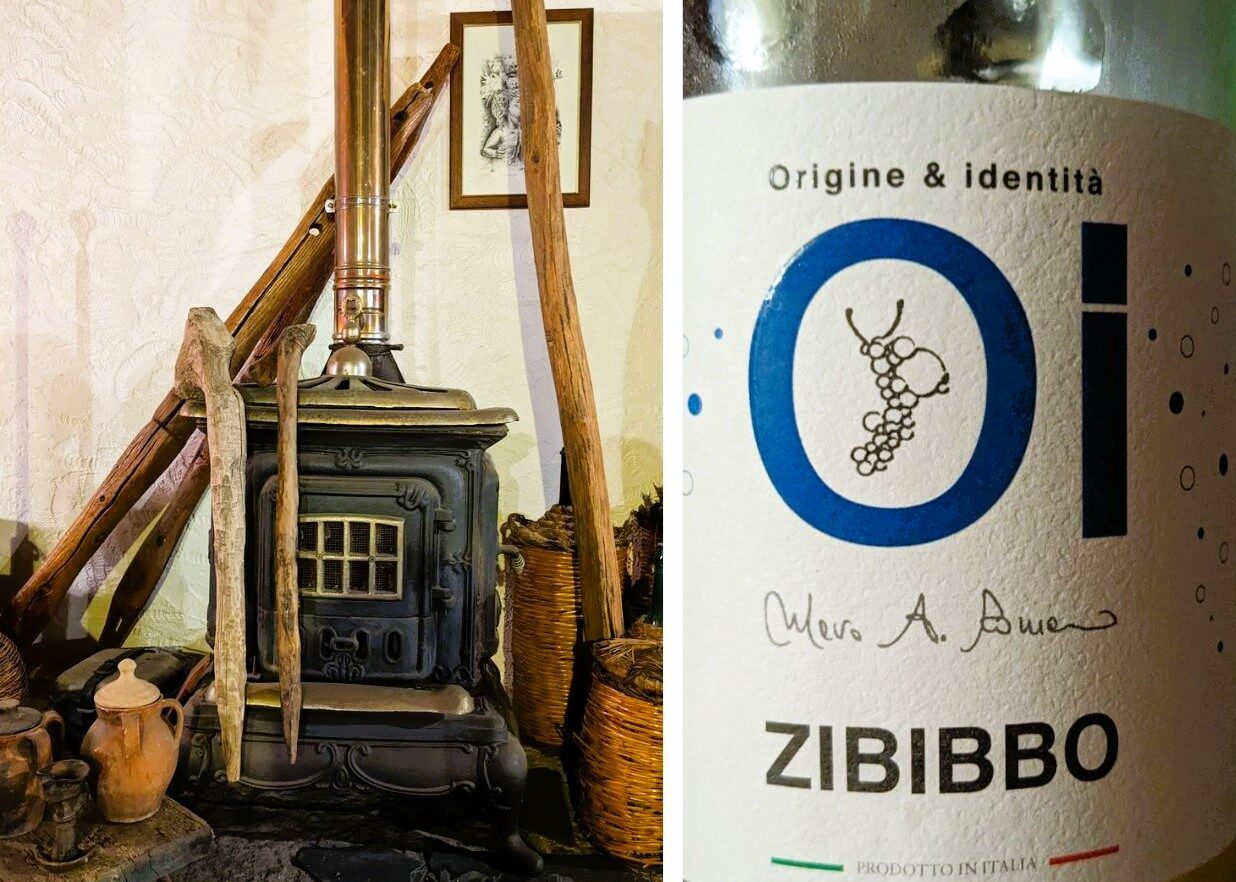
He tells us it is a word-of-mouth operation, a chef in Canada who is Calabrian buys cases from them for his restaurant—one in Milan, several similarly throughout Italy, of course Qafiz. They are sold in some stores in Calabria but not served in too many restaurants. The more touristy restaurants prefer to serve the cheaper wine from the bigger wineries as the clientele do not know Calabrian wines and are unwilling to take a chance on a more expensive wine that they cannot taste by the glass.
There used to be many more people who grew grapes and bottled wine for boutique consumption in Calabria, he explains. The fields have been taken over by red onions, easier to sell, and fetch a higher price point than the grapes. Such is the Stanley effect.
He finally takes us into the dinner table where we are treated to another feast. We were expecting wine pairings with appetizers. We are fed course after course of traditional Calabrian cuisine—three kinds of bruschetta, cheeses, two kinds of bean stews, eggplant, grilled meats come out with bottle after bottle of wine, some from his private collection, no labels, homemade amaro. And of course, salads with red onion. There is no charge for this “tasting.” We are there till 2 AM in the morning.
We leave buying cases of wine—partly from guilt we have kept him for so long, partly because we are tipsy, full, and happy. Mark and I have no way of taking this home with us as we leave for Albania in the morning. Mauro and Eva graciously agree to hold onto our case till we come back. And come back we will to this gracious land with the lowly onion and the divine bounty. Till next time.


